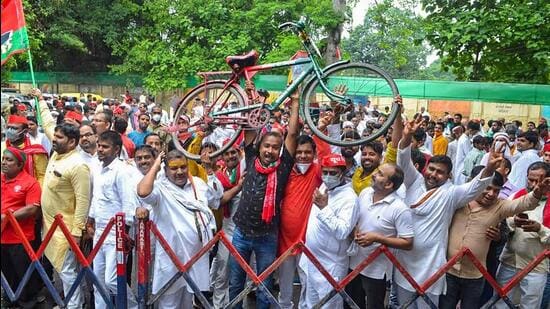Caste, religion narrative spices up 2024 Lok Sabha polls script for Samajwadi Party
The new Samajwadi Party national executive matches the caste percentages in Uttar Pradesh. The executive has 11 Yadavs, 10 Muslims and nine upper caste members.
A dose of religion and caste-based narrative is raising the political temperature even as the script for the 2024 Lok Sabha polls is being written. The Samajwadi Party looks to take advantage of these issues and utilize its social engineering formula in its bid to stop the BJP from winning all 80 Lok Sabha seats in Uttar Pradesh.

So, around the time the SP announced its national executive on Sunday, party chief Akhilesh Yadav said in Kannauj: “Yesterday, I went to a temple, and an attempt was made (by BJP people) to prevent me from doing havan”.
Around the same time, his close lieutenant and national secretary Rajendra Chaudhary participated in Sundarkand recital at an event in Lucknow.
Referring to his own frequent statements on the Hindu epic Ramcharitmanas, Swami Prasad Maurya, the newly appointed national general secretary of the party, said in Lucknow that he will continue to struggle against the disrespect to Dalits, backwards, and tribals in the name of religion.
In a far corner of Lucknow, a handful of Akhil Bharatiya OBC Mahasabha volunteers burned copies of a few pages of the Ramcharitmanas in support of Swami Prasad Maurya’s stance.
By the time one could finish going through the list of the 64-member national executive of the party on Sunday, it was quite clear that the party is engaged in social engineering formula for the 2024 Lok Sabha polls.
The list of 64 (new national executive) indicates that without compromising much on the MY (Muslim-Yadav) factor, the SP wishes to expand further among the non-Yadav OBCs (other backward classes), Dalits, upper caste Hindus, and even non-Muslim minorities. Akhilesh already tested the formula, to his party’s gain, in the 2022 U.P. assembly elections.
He inducted a significant number of senior and influential OBC, Dalit, and upper caste leaders from the Bahujan Samaj Party (BSP), Congress, and the BJP. Besides, he played the MY-OBC-Dalit card and resorted to the soft Hindutva formula. All these steps helped him increase his party’s tally of seats from 47 to 111 in the state assembly. On Sunday, he formalised the formula through the list of 64 national executive members.
In Uttar Pradesh, the elections since 2014 have been largely BJP vs SP.
The BJP’s original core vote in the state was upper caste Hindus and the SP’s Muslim and Yadav. Upper caste Hindus in the state constitute roughly 18% of the population, Muslims 20% and Yadavs about 9%.
The new Samajwadi Party national executive matches the caste percentages in Uttar Pradesh. The executive has 11 Yadavs, 10 Muslims and nine upper caste members.
It is the fight for the OBCs and Dalit votes between the SP and the BJP that holds more interest.
The state has nearly 32% non-Yadav OBCs. The SP included 25 non-Yadav OBCs in the executive. Against nearly 18-20% Dalits in the state, the SP executive has six Dalits and a scheduled tribe member. The party made one of its Kerala members, a Christian, national general secretary.
Aiming to win over OBCs, the SP had been harping on the caste census for “just representation of various caste groups in jobs as per their share in the population”. In its 2022 U.P. assembly manifesto, the SP declared that it will get a caste census done at the state government level if it came to power. It didn’t win the polls, but the neighbouring Bihar government undertook a caste census. Now, the SP has again become vocal about caste census in the country and the state. Akhilesh on Saturday said he had asked Swami Prasad Maurya to move forward on the caste census agenda as he had proposed.
After meeting Akhilesh, Maurya had said that he or the party would write to the central government demanding the caste census.
Political analyst and former head of the department of political science Lucknow University SK Dwivedi, who had been closely watching the row triggered around Ramcharitmanas, says: “It’s all targeted towards the approaching polls”.
He also said the late Rajni Kothari, in the 1960s-70s wrote in one of his books, that Indian politics cannot get rid of caste elements.
“He said so true. Indian politics is not able to get rid of caste and religion. And this is unfortunate. Swami Prasad Maurya and Akhilesh are targetting OBCs through the recent political discourse around Ramcharitmanas.”
About the new national executive of the party, Dwivedi said: “It is clear that Akhilesh wants to add OBCs and Dalits to Muslim-Yadav votes in favour of his party.”
He said that the BJP was also engaged in a counter-narrative to attract OBCs and Dalits votes to itself.
Bahujan Samaj Party (BSP) chief Mayawati attacked both the BJP and the SP on Monday. She said the two wanted to polarise the people on caste and communal lines before the elections.
There are broad indications that the state executive, which the SP would announce soon, would have a similar tone as the national executive with a focus on OBCs and Dalits.
The battle lines are drawn with the BJP saying it will win all 80 Lok Sabha seats in UP, and Akhilesh claiming the ruling party may not even win a single Lok Sabha seat in the state.





